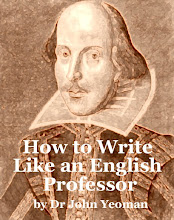It's raining. It's France. And in utter despair, satiated with cafe cremes and Gauloises, I have just finished Empson's Seven Types of Ambiguity. (All the footnotes in text on an ebook reader disappear into arcane spaces. With Empson, this is a very good thing.)
That sweet old duffer finds seven different meanings for the term 'wit' in Pope's Essay on Criticism but utterly fails to detect its implicature as a sexual double entendre! (Would you believe?) However, it seems unlikely that Pope was unaware of the possible sub-text of the term 'wit' and - given his plethora of ribald double entendres in the contemporaneous The Rape of the Lock (1712) - I think I might legitimately defy Empson to detect in Pope's Essay a rakish wink of the Jacobethan, as in: ‘young Lords had wit:/The Fair sat panting at a Courtier’s play,/And not a Mask went unimproved away’ (line 541).
Had Empson never read the Nurse's lines in Romeo and Juliet, where 'wit' is explicitly sexual? Or Sidney's Defense of Poesie ('the erected wit')?
But what else can you expect of a man who wore a 19th century beard but was a contemporary of Ronald Reagan? Answer: word blindness and temporal disorientation.
Damn it, it's still raining.
Saturday, 4 July 2009
Subscribe to:
Post Comments (Atom)
Read 'The Apothecary's Tales' now
at Smashwords.com: http://www.smashwords.com/books/view/2958
Many have proposed that The Apothecary's Tales is a detective novel in the genre of historical fiction or fictive history set in the Jacobean and Elizabethan era called the Jacobethan (or the age of Shakespeare). Certainly, its tone of mystery, suspense, humour, comedy and ribald sex might suggest that. However, the mystery, detective and thriller elements merely support its presentation as an historical novel; they do not invaidate the possibility that it is a true account originally written in the language of Shakespeare and revised for the reader of modern historical novels.
Many have proposed that The Apothecary's Tales is a detective novel in the genre of historical fiction or fictive history set in the Jacobean and Elizabethan era called the Jacobethan (or the age of Shakespeare). Certainly, its tone of mystery, suspense, humour, comedy and ribald sex might suggest that. However, the mystery, detective and thriller elements merely support its presentation as an historical novel; they do not invaidate the possibility that it is a true account originally written in the language of Shakespeare and revised for the reader of modern historical novels.

No comments:
Post a Comment